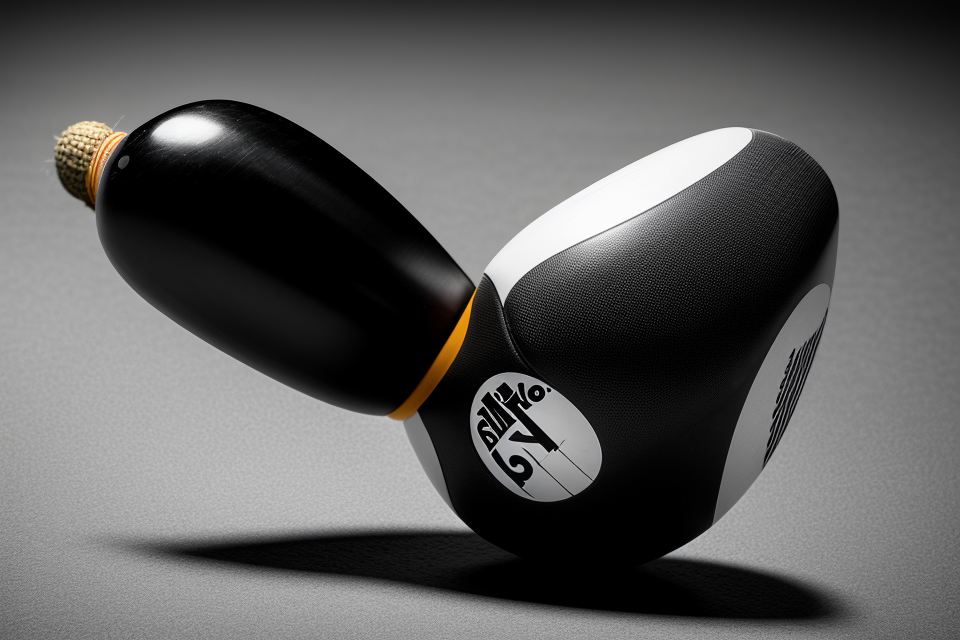Are you tired of losing to stronger opponents in squash? Do you want to learn effective strategies and tactics to outplay them? Look no further! In this article, we will explore some proven techniques that can help you beat a better player in squash. From improving your physical fitness to developing your mental game, we’ll cover everything you need to know to elevate your squash skills and dominate the court. So, gear up and get ready to take your game to the next level!
Understanding Your Opponent’s Strengths and Weaknesses
Analyzing Your Opponent’s Playstyle
In order to outplay stronger opponents in squash, it is crucial to understand their playstyle and exploit their weaknesses. Here are some key factors to consider when analyzing your opponent’s playstyle:
- Court coverage: Observe how your opponent moves around the court and their positioning during rallies. This can give you an idea of their strengths and weaknesses and how they may attack or defend.
- Strengths and weaknesses: Identify your opponent’s strengths and weaknesses by paying attention to their shots and tactics. Some players may have a powerful forehand, while others may have a weaker backhand.
- Preferred shots and strategies: Determine your opponent’s preferred shots and strategies. For example, some players may prefer to play defensively and wait for their opponent to make a mistake, while others may be more aggressive and try to control the tempo of the game.
By analyzing your opponent’s playstyle, you can develop a strategy to outplay them and gain an advantage on the court.
Adapting Your Game to Counter Their Strengths
- Adjusting your court positioning: One effective way to counter a stronger opponent is to adjust your court positioning. This means moving around the court more and positioning yourself in such a way that it makes it harder for your opponent to hit their shots. For example, if your opponent is a powerful player who likes to hit from the back of the court, you can move forward and take away their time and space. Alternatively, if your opponent is a skilled volleyer, you can move back and force them to hit into the front of the court.
- Modifying your shot selection: Another strategy is to modify your shot selection. This means deliberately choosing shots that are harder for your opponent to return. For example, if your opponent is a powerful player, you can hit more drops and boasts, which are higher-bouncing shots that are harder to return. If your opponent is a skilled player who likes to hit tight angles, you can hit more straight shots or use the wall to bounce the ball off and catch them off guard.
- Incorporating deception and unpredictability: Deception and unpredictability are key tactics for outplaying stronger opponents. This means mixing up your shots and making it difficult for your opponent to read your intentions. For example, you can hit a series of shots to one side of the court, then suddenly switch to the other side to throw off your opponent’s rhythm. Alternatively, you can fake a shot and then hit a different shot, making it harder for your opponent to anticipate your moves.
By incorporating these strategies into your game, you can effectively counter your stronger opponents and outplay them on the squash court.
Developing Your Own Strengths
Physical Fitness and Conditioning
Improving your endurance and speed, enhancing your strength and agility, and maintaining proper footwork and balance are crucial components of physical fitness and conditioning in squash. To outplay stronger opponents, it is essential to have a well-rounded physical game that enables you to perform at your best. Here are some tips to help you improve your physical fitness and conditioning:
- Cardiovascular training: Squash is an aerobic sport that requires good cardiovascular fitness. Incorporating cardiovascular training into your fitness routine can help improve your endurance and reduce the risk of fatigue during matches. You can include activities such as running, cycling, or swimming in your training regimen to improve your cardiovascular fitness.
- Strength training: Squash also requires strength and power, especially when it comes to hitting the ball with force. Incorporating strength training exercises into your fitness routine can help you build the necessary muscle strength and power to perform at your best. Exercises such as lunges, squats, and deadlifts can help improve your leg strength, while exercises such as push-ups and pull-ups can help build upper body strength.
- Footwork drills: Proper footwork is essential in squash, as it allows you to move quickly and change direction quickly. Incorporating footwork drills into your training regimen can help improve your footwork and balance. Drills such as ladder drills, shuffle drills, and agility cones can help improve your footwork and agility.
- Flexibility and mobility training: Squash involves a lot of movement, and having good flexibility and mobility can help prevent injuries and improve your performance. Incorporating stretching and mobility exercises into your training regimen can help improve your flexibility and range of motion. Yoga and Pilates are great ways to improve flexibility and mobility.
By focusing on physical fitness and conditioning, you can improve your overall performance on the squash court and increase your chances of outplaying stronger opponents.
Technical Skills and Tactics
To outplay stronger opponents in squash, it is essential to develop your own strengths by mastering the fundamentals of the game, enhancing your shot selection and accuracy, and developing effective strategies and tactics. Here are some ways to improve your technical skills and tactics:
Mastering the Fundamentals of Squash
The fundamental skills of squash include basic footwork, stance, and grip. By mastering these skills, you can improve your overall game and gain confidence against stronger opponents.
- Footwork: Good footwork is essential in squash, as it allows you to move quickly and change direction. Focus on developing your footwork by practicing lateral movements, forward and backward movements, and directional changes.
- Stance: Your stance should be balanced and athletic, with your feet shoulder-width apart and your weight evenly distributed on both feet. Keep your knees bent and your eyes focused on the ball, and move your feet quickly and efficiently to get into position for each shot.
- Grip: Your grip should be comfortable and secure, with your fingers spread evenly around the handle and your thumbs positioned on either side. Practice your grip by holding the racket in different positions and swinging it in different directions.
Enhancing Your Shot Selection and Accuracy
Shot selection and accuracy are critical in squash, as they allow you to control the pace and direction of the game. To enhance your shot selection and accuracy, focus on the following:
- Practice your forehand and backhand shots: Develop a consistent and accurate forehand and backhand by practicing them in different situations, such as hitting to the front and back walls, and using different types of shots, such as drops and drives.
- Develop your volley and overhead shots: Improve your volley and overhead shots by practicing them in different situations, such as hitting a high ball or a ball that is coming towards you.
- Learn to control your shots: Control your shots by practicing them in different situations, such as hitting to the corners or to the back wall. This will help you to keep the ball in play and set up your next shot.
Developing Effective Strategies and Tactics
Effective strategies and tactics can help you to outplay stronger opponents in squash. To develop these skills, focus on the following:
- Study your opponent’s game: Analyze your opponent’s strengths and weaknesses, and develop a strategy to exploit their weaknesses and neutralize their strengths.
- Develop a game plan: Develop a game plan for each match, taking into account the court conditions, your opponent’s game, and your own strengths and weaknesses.
- Use your strengths to your advantage: Identify your strengths and use them to your advantage, such as using your dominant eye to hit a forehand shot or using your height to hit a volley.
- Practice your mental game: Develop a strong mental game by focusing on your strengths, staying positive, and staying focused on the game. This will help you to stay calm and focused under pressure, and to outplay stronger opponents.
Mental Preparation and Focus
Developing a Winning Mindset
- Building confidence and self-belief
- Recognizing personal strengths and abilities
- Visualizing success and positive outcomes
- Affirmations and positive self-talk
- Managing anxiety and stress
- Deep breathing and relaxation techniques
- Focusing on the present moment
- Pre-competition routines and rituals
- Staying focused and disciplined
- Setting clear goals and objectives
- Developing a pre-match routine
- Maintaining concentration during the match
Building confidence and self-belief is crucial in developing a winning mindset. Athletes should recognize their personal strengths and abilities and focus on them. Visualizing success and positive outcomes can also help boost confidence and belief in one’s abilities. Affirmations and positive self-talk can also be useful in building confidence and maintaining a positive mindset.
Managing anxiety and stress is also an important aspect of developing a winning mindset. Deep breathing and relaxation techniques can help athletes manage their anxiety and stay calm during competition. Focusing on the present moment can also help athletes avoid getting overwhelmed by the pressure of the competition. Pre-competition routines and rituals can also be helpful in managing anxiety and stress.
Staying focused and disciplined is also crucial in developing a winning mindset. Athletes should set clear goals and objectives and develop a pre-match routine to help them stay focused and disciplined. Maintaining concentration during the match is also important in order to stay focused and avoid distractions. By developing a winning mindset, athletes can increase their chances of outplaying stronger opponents in squash.
Staying Adaptable and Resilient
Adapting to changing game conditions
In squash, game conditions can change rapidly, and it’s crucial to adapt to these changes to stay ahead of your opponent. One effective way to do this is to focus on your strengths and use them to your advantage, even if the situation calls for a different style of play. For example, if you typically rely on your power game, but find yourself facing an opponent who is particularly adept at countering power shots, you might need to adjust your strategy and focus more on precision and control.
Overcoming adversity and setbacks
Another important aspect of staying adaptable and resilient in squash is the ability to overcome adversity and setbacks. Every player will face challenges and setbacks during a match, and it’s crucial to stay focused and maintain a positive mindset even when things aren’t going your way. This might involve rethinking your strategy, adjusting your tactics, or simply taking a break to regroup and refocus.
Continuously learning and improving
Finally, staying adaptable and resilient in squash requires a commitment to continuous learning and improvement. This means constantly analyzing your performance, seeking feedback from coaches and peers, and working to identify areas where you can improve. It also means staying up-to-date with the latest developments in squash strategy and technique, and incorporating new ideas and approaches into your game as appropriate. By embracing a growth mindset and staying open to new ideas and perspectives, you’ll be better equipped to adapt to changing game conditions and overcome adversity on the squash court.
Utilizing the Power of Surprise
Employing Deception and Fakes
When facing a stronger opponent in squash, one effective strategy is to use deception and fakes to throw them off balance. Here are some ways to do that:
Creating false openings and leads
By making your opponent think you’re going to hit to one side of the court, when you actually hit to the other side, you can catch them off guard and create an opening for yourself. For example, you could make a big show of warming up your backhand, then suddenly switch to your forehand.
Faking shot direction and speed
Another way to deceive your opponent is by fake shot direction and speed. For instance, you could make it look like you’re going to hit a soft drop shot, but instead hit a hard drive. Or, you could make it look like you’re going to hit a hard shot, but instead hit a soft boast.
Utilizing the boast and drop shot effectively
The boast and drop shot are two powerful weapons in a squash player’s arsenal, and can be especially effective when used strategically. By using these shots at the right time, you can catch your opponent off guard and set up other attacks. For example, you could use a boast to get your opponent out of position, then follow up with a drop shot to the opposite corner.
Mixing Up Your Game
In order to outplay stronger opponents in squash, it is essential to incorporate unconventional shots and tactics, vary your pace and intensity, and keep your opponent off balance. This can be achieved by implementing the following strategies:
- Incorporating unconventional shots and tactics:
- Using the reverse swing: The reverse swing is a shot that is executed by hitting the ball with the opposite hand to the one you normally use. This shot can catch your opponent off guard and throw off their timing.
- Using the boast: The boast is a shot that is hit high and hard off the back wall. It can be used to surprise your opponent and catch them off balance.
- Using the volley: The volley is a shot that is hit on the rise. It can be used to disrupt your opponent’s rhythm and force them to change their strategy.
- Varying your pace and intensity:
- Changing the pace of the game: By varying the speed of your shots, you can keep your opponent guessing and force them to adjust their own pace.
- Intensifying the game: By increasing the intensity of your shots, you can make it more difficult for your opponent to return them and gain control of the game.
- Keeping your opponent off balance:
- Using deception: By pretending to make one shot and then changing direction, you can confuse your opponent and catch them off guard.
- Using the “stop-and-start” tactic: By suddenly stopping or starting your movement, you can disrupt your opponent’s rhythm and throw off their timing.
- Using the “hide-and-seek” tactic: By hiding behind the wall or using the side walls to your advantage, you can make it more difficult for your opponent to hit a return and gain control of the game.
Building a Solid Squash Foundation
Regular Practice and Training
- Setting achievable goals and milestones:
- Establishing specific, measurable objectives
- Periodically reassessing progress and adjusting goals
- Incorporating both short-term and long-term targets
- Practicing regularly with purpose and focus:
- Scheduling dedicated practice sessions
- Prioritizing skills that need improvement
- Maintaining a consistent work rate and intensity
- Seeking guidance from coaches and mentors:
- Finding experienced professionals who can provide constructive feedback
- Utilizing video analysis to identify areas for improvement
- Incorporating corrective exercises and drills into practice routines
Regular practice and training are crucial for building a solid squash foundation. By setting achievable goals and milestones, you can establish a clear direction for your progress and maintain motivation. It is essential to practice regularly with purpose and focus, scheduling dedicated sessions and prioritizing skills that need improvement. Seeking guidance from coaches and mentors can provide valuable insights and help identify areas for improvement. Through consistent effort and dedication, you can develop the skills and physical attributes necessary to outplay stronger opponents in squash.
Analyzing and Learning from Each Match
In order to improve your squash game and outplay stronger opponents, it is essential to analyze and learn from each match you play. Here are some key steps to help you do just that:
Reviewing your performance and mistakes
After each match, take some time to review your performance and identify any mistakes you made. This could include things like missing shots, making poor decisions, or not moving efficiently around the court. It’s important to be honest with yourself about your mistakes, as this will help you learn and improve.
Identifying areas for improvement
Once you have identified your mistakes, it’s time to identify areas for improvement. This could include things like working on your footwork, improving your shot selection, or developing your physical fitness. It’s important to focus on specific areas that will have the biggest impact on your game.
Learning from your successes and failures
Finally, it’s important to learn from both your successes and failures. Take note of what worked well in your matches and what didn’t, and use this information to inform your training and future matches. Don’t be afraid to experiment with new strategies or techniques, but make sure you are always learning from your experiences.
By following these steps, you can begin to build a solid squash foundation that will help you outplay stronger opponents. Remember, it’s not just about physical skills – it’s also about mental toughness, strategy, and adaptability. With hard work and dedication, you can become a formidable opponent on the squash court.
FAQs
1. What are some effective strategies for beating a better player in squash?
Beating a better player in squash requires a combination of physical fitness, mental toughness, and strategic gameplay. Here are some effective strategies to consider:
* Focus on your strengths: Identify your strengths as a player and focus on using them to your advantage. For example, if you have a powerful shot, use it to your advantage and try to force your opponent off the wall.
* Hit to your opponent’s weaker side: Pay attention to your opponent’s movements and try to hit the ball to their weaker side. This can help you gain an advantage and force them to make mistakes.
* Be consistent: Make sure to keep the ball in play and be consistent with your shots. This can help you build momentum and keep your opponent off balance.
* Stay focused: Squash is a fast-paced game that requires mental focus and concentration. Stay focused on the game and avoid getting distracted by your opponent’s movements or anything else going on around you.
2. How can I improve my squash skills to beat better players?
Improving your squash skills to beat better players requires a combination of practice, physical fitness, and mental toughness. Here are some tips to help you improve:
* Practice regularly: Regular practice is essential for improving your squash skills. Try to practice at least three times a week, and focus on improving your weaknesses.
* Work on your physical fitness: Squash is a physically demanding sport that requires good cardiovascular fitness, strength, and agility. Incorporate strength and conditioning exercises into your training routine to improve your physical fitness.
* Learn from your mistakes: Don’t be afraid to make mistakes – they are an essential part of the learning process. Analyze your mistakes and learn from them to improve your game.
* Stay positive: Mental toughness is essential in squash. Stay positive, focus on your strengths, and don’t let your opponent’s skill level intimidate you.
3. What are some effective tactics for beating a better player in squash?
Beating a better player in squash requires a strategic approach and the ability to adapt to your opponent’s style of play. Here are some effective tactics to consider:
* Mix up your shots: Don’t rely too heavily on one shot or strategy. Mix up your shots and keep your opponent guessing.
* Attack your opponent’s weaknesses: Pay attention to your opponent’s movements and try to attack their weaknesses. For example, if they have a weak backhand, try to hit to that side of the court.
* Use the wall to your advantage: The wall can be a powerful ally in squash. Use it to your advantage by hitting the ball hard and forcing your opponent to retreat.
* Be patient: Squash is a game of patience. Don’t rush your shots or make impulsive decisions. Take your time and wait for the right opportunity to attack.
4. How can I deal with the pressure of playing against a better player?
Playing against a better player can be intimidating, but it’s important to stay focused and maintain your composure. Here are some tips to help you deal with the pressure:
* Stay positive: Maintain a positive attitude and focus on your strengths. Don’t let your opponent’s skill level intimidate you.
* Take deep breaths: When you’re feeling overwhelmed, take a deep breath and focus on your breathing. This can help you calm down and stay focused.
* Visualize success: Visualize yourself playing well and winning the match. This can help you build confidence and stay motivated.
* Don’t compare yourself to your opponent: Remember that everyone has their own strengths and weaknesses. Don’t compare yourself to your opponent – focus on your own game and what you can do to










